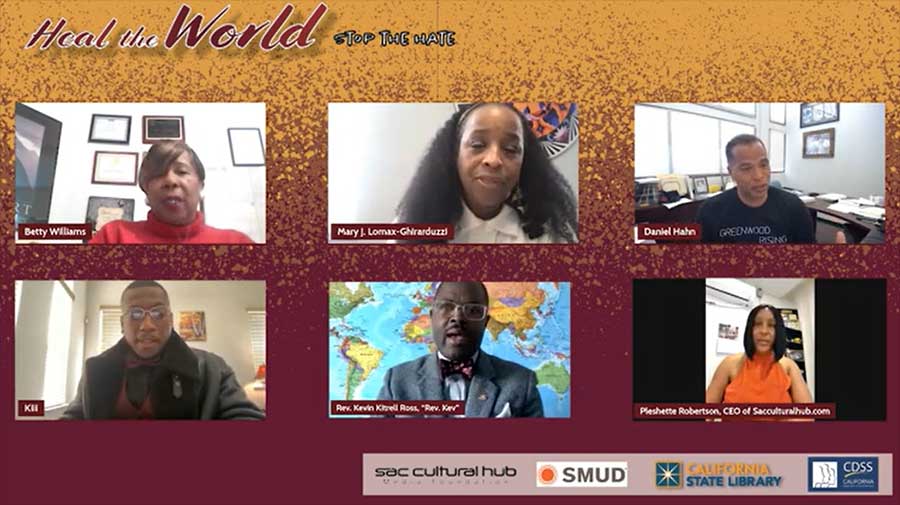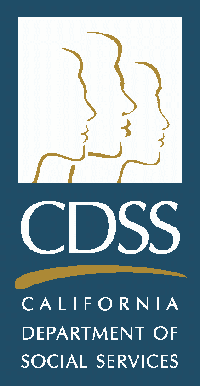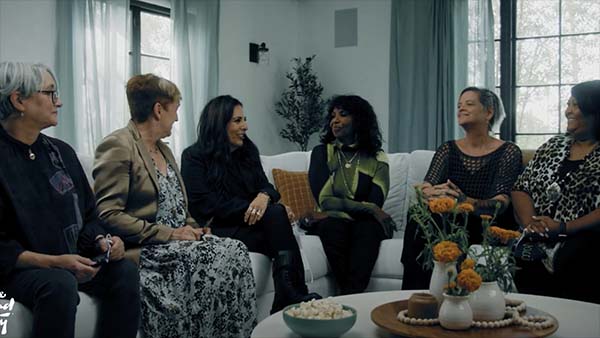
“Heal The World! Stop The Hate!” Townhall on Hate Crimes delivered Several Drop The Mic’ Moments
By Michael P Coleman
Continuing a tradition of assembling our region’s greatest thought leaders in conversation about issues germane to communities of color, the Sac Cultural Hub Media Company & Foundation recently hosted a live virtual event, “Heal The World! Stop The Hate!”
The event’s panel featured Daniel Hahn, retired City of Sacramento Chief of Police and Dean of the Sacramento Regional Public Safety Center at American River College; Kiii, an emerging music artist, producer, and label owner; Mary J. Lomax-Ghirarduzzi, Vice President for Diversity, Equity, and Inclusion and Chief Diversity Officer at the University of the Pacific; and Betty Williams, President of the Greater Sacramento NAACP and owner of 1 Solution of California Outreach & Recruitment Firm.
CLICK HERE to watch full video of the townhall.
“Heal The World! Stop The Hate” was hosted by Senior Minister and CEO of Unity of Sacramento, Rev. Kevin Ross and was broadcast via Facebook Live. The event was sponsored by SMUD, with additional support from the California Public Library and the California Commission on Asian and Pacific Islander American Affairs.
After a brief introduction by Sac Cultural Hub Media Company and Foundation founder Pleshette Robertson and a short video that provided context for the conversation on hate crimes — there’s been a 25% increase in hate crimes over the last 10 years, and a 31% increase between 2019 and 2020 — Ross posed an overarching question for the panelists: “How can we as conscious citizens make this a world of peace?”
Williams was first to address that question, referencing the sharp increase in the number of hate crime calls flooding her NAACP office. “They’re nasty, and at a different level than we’ve seen in the past,” she said.
“Just prior to this meeting, just 30 minutes ago, two calls came in that included ‘the N word’,” Williams continued. “Those are hate incidents, as there’s been no physical harm or destruction of property. We need to educate people that hate crime is a crime. We’ve been working with Sacramento County and a number of school districts, because current school codes only include students, and our teachers and staff are being attacked, too. We’re also looking at housing, and some of the [hate-based] laws that are still on the books.”
Williams attributed her office’s increase in hate crime calls to what she calls “the browning of America.”
“We’re browning in Sacramento. We’re browning in California. Our school districts are browning,” Williams said. “To some people, they’re losing control. They’re losing power.”
After being asked to clarify whether the people of whom she spoke were whites who hold positions of power, Williams delivered the event’s first “drop the mic” moment.
“That’s absolutely who I’m talking about,” Williams said. “The minority is now the new majority. That old majority is losing its footing. That creates fear, and fear is ignorance, which creates hate.”
Lomax-Ghirarduzzi’s talk centered around systemic issues of racism that our society has, in her estimation, “never dealt with.”
“Those issues are embedded in the legislation that has guided public policy,” Lomax-Ghirarduzzi said, “which creates the cultures we see at schools and in the workplace. There is an onslaught of change that is happening. Every year, schools are getting more diverse, and the professional workplace isn’t matching that, [with] people saying mean things to each other. Sometimes the incident doesn’t rise to the level of a hate crime, but you’ve harmed someone.”
Hahn said the distinction between a hate incident (many of which are protected under the Constitution’s First Amendment) and a hate crime is incidental.
“To call something a hate crime, you have to have facts that you can present in court,” Hahn shared. “Whether it’s a hate crime or not is irrelevant. It’s still harmful, and it’s limiting our ability to be successful as a country.”
Hahn also shared a lack of surprise about the sharp increase in hate crimes, citing periods in our nation’s history when hate has grown during difficult times. He used the moment to help attendees connect the dots between events in our nation’s history and hate.
“If you look at the rise of the [Ku Klux] Klan, the Civil Rights Movement, the Great Depression…with COVID and [recent] social justice movements, we’ve had a hard time,” Hahn said. “If you know history, you know that some of these hateful things are going to grow. People need someone to blame.”
Kiii wrapped the panel discussion up with his view about music having the potential to be “socially empowering, especially when combating racism” and that the current state of hip hop “…isn’t in alignment with moving forward.” He cited Vice Staples, Kendrick Lamar, and J. Cole as artists who should be one’s “go tos” if one is looking for social responsibility in hip hop.
“[Music carries] the power of the tongue,” Kiii said. “We have to be responsible to narrate the world we’re living in. Hip hop doesn’t naturally address or resist hate crimes, but I see the value in the potential of it being a tool.”
If you think that you or someone you know has been a victim of a hate crime, contact the federal Department of Justice toll-free at 877-433-9069 or the Sacramento NAACP at 916-856-0155.
Daniel Hahn teaches a class on “critical race theory,” which he insists should be referred to as “history!” Connect with him on LinkedIn.
Kiii’s new album, “Reap What You Sow,” will be released on all digital platforms on March 10.
Connect with freelance content creator Michael P Coleman at michaelpcoleman.com, on IG or Twitter (@ColemanMichaelP), or on LinkedIn.
If you are of African descent (Black / African American) living in California, and you have survived a hate crime or incident, or you are a family member of someone who lost their life to a hate crime, and would like to share your story or testimony with THE HUB, e-mail contact@sacculturalhub.com or call 916-234-3589. With your help, THE HUB can attempt to be apart of solutions that heal the community while forging ahead to stop the hate. Thank you!
The Stop The Hate campaign is made possible with funding from the California State Library (CSL) in partnership with the California Commission on Asian and Pacific Islander American Affairs (CAPIAA). The views expressed on this website and other materials produced by Sac Cultural Hub Media Foundation do not necessarily reflect the official policies of the CSL, CAPIAA or the California government. Learn more about the Stop The Hate campaign at: https://capiaa.ca.gov/stop-the-hate/






